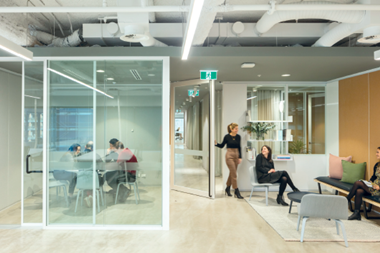Research from Ropes & Gray has revealed that the activities of flexible workspace providers could grow even faster in an economic downturn.
The law firm’s Coworking: A real estate revolution? research states that the coworking sector is set for further growth, and an economic downturn will not hamper this trend.
“Instead, it could actually accelerate it.”
Based on a survey of 100 senior executives from across the real estate industry, the majority of lenders (61%) believe that coworking will be less vulnerable than traditional office space in an economic downturn.
The research also revealed that 73% of all respondents believe an economic downturn will actually benefit the coworking sector, as coworking membership is likely to grow in a contracting economy due to a rise in self-employment.
The report also showed that most people (55%) expect coworking to continue to absorb traditional office space market share to over the next three years, as start-ups and the independent workforce grow and both small and large companies shift into community workspaces.
The report also revealed the extent to which coworking has already forced traditional commercial real estate models to evolve.
Ropes & Gray’s research also stated that more than two thirds (67%) of ”equity investors and traditional landlords expect significant consolidation in the coworking sector”.
The rest expect at least moderate consolidation, it said, adding that 99% of all respondents say that real estate investment trusts are “natural long-term buyers of coworking operators and assets”.
David Seymour, a private equity real estate partner at Ropes & Gray, said it is clear that this new way of working is only going to increase over the coming years and may even accelerate in the event of a recession.
“We’re seeing early signs of coworking operators shifting into other asset classes, such as residential and the hotel and leisure sectors.
“At the same time we are also seeing hints of a shift among those turning to coworking as a viable option. Freelancers, creatives and technology companies may soon be battling larger companies, as they look for more flexibility in their office needs, for shared spaces.”








